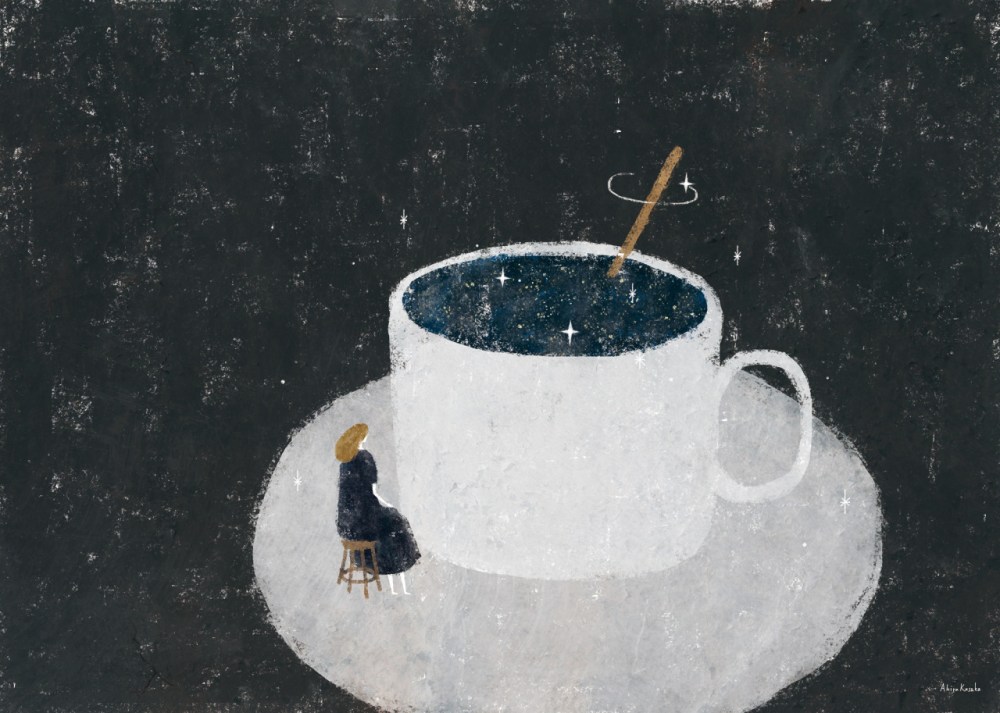Does quitting coffee make you have a headache? You must know the 8 fallacies of coffee!

Professional coffee knowledge exchange more coffee bean information please follow the coffee workshop (Wechat official account cafe_style)
Is drinking coffee refreshing? Will drinking more coffee make your heart beat faster again? After quitting coffee, will you be depressed every day? At the beginning of the new year, recognize the eight fallacies of drinking coffee. Drink Smart 、 Live Smart .
Photo credit: Akira Kusaka
Fallacy one. Caffeine is refreshing?
Correctly speaking, caffeine is sleepless. The human brain adjusts the physiological clock by means of nerve conduction. One of the key conductors, adenosine, binds to the receptor in the medium (adenosine 2A), turns on the sleep switch, and then we fall asleep. The structure of caffeine is very similar to that of adenosine. When the receptor in the brain binds caffeine, adenosine cannot bind to the receptor (called "competitive receptor"). If it is unable to start sleep, it will make people unable to sleep.
Fallacy two. Do European and American people drink a few cups of coffee every day because they are used to it?
It's not because of habits, but because of genetic differences. The cytochrome P450 system in the liver is responsible for caffeine metabolism in the human body, and one of the genes is CYP1A2. A journal of pharmacogenomics has found that Asian CYP1A2 controls the position of caffeine metabolism, and most of them have the form of C, which makes Asians have lower ability to metabolize caffeine than Europeans and Europeans, which prolongs the half-life of caffeine in the body, which is one of the reasons why it is difficult for Asians to drink a few cups of coffee a day.
Fallacy three. Long-term intake of caffeine can cause a heartbeat?
A study in the Journal of the American Cardiology Association found that 61 per cent of nearly 1400 participants consumed a cup of caffeine a day. The participants wore electrocardiographic monitoring devices to monitor heart condition for 24 hours, with indicators of early ventricular or early atrial contraction. The results showed that there was no significant correlation between the frequency of early cardiac contraction per hour or the number of times throughout the day and caffeine intake.
Fallacy four. Is someone immune to caffeine?
Indeed, some people are less sensitive to caffeine. The receptor adenosine 2A may decrease the sensitivity of caffeine to this receptor because of its genotype. The gene of this receptor is ADORA2A, and studies have found that this gene has genetic polymorphism (single nucleotide polymorphism) on 1083 of the base pairs, changing from the original CC type to the CT or TT type. A study in the American Journal of Clinical Nutrition found that people with CC or CT types consumed less caffeine, while people with TT types were less sensitive to caffeine, so they consumed more caffeine.
Fallacy five. Does quitting coffee make you have a headache?
Figures from a study in the American Journal of Psychiatry show that after quitting coffee, 50% of the participants had headaches and 13% had dysfunctional problems, which generally occurred 12 to 24 hours later. 20 to 51 hours is the peak of symptoms and lasts for 2 to 9 days.
Fallacy six. Deep-roasted coffee contains more caffeine?
The caffeine is the same. Deep-roasted coffee is bitter and gives people the illusion that deep-roasted coffee contains more caffeine, but studies have found that coffee with different roasting degrees has roughly the same amount of caffeine extracted. The baking time is longer, but the water is evaporated more, which does not affect the caffeine content. However, deep-roasted coffee because it is relatively light, to make the same amount of coffee, need more coffee beans, the total amount of caffeine is more. Some people in the industry say that there are "more coffee beans", but there is only a negligible difference in caffeine content.
Fallacy seven. Can drinking coffee lead to osteoporosis?
If calcium intake is insufficient, caffeine does increase the risk of osteoporosis, all because caffeine activates osteophagocytes in bones and promotes the release of bone calcium into the bloodstream. A study in the International Journal of Osteoporosis found a significant increase in daily coffee intake and the risk of osteoporosis. However, this does not mean that drinking coffee will lead to osteoporosis. The key is a lack of calcium intake.
The premise of the above data is that calcium intake is less than 700 mg, and the study found that if calcium intake is above 700 mg, coffee and caffeine intake are not significantly associated with the risk of osteoporosis.
There are eight fallacies. Reheat the coffee in the microwave without losing its aroma?
As the coffee cools, the acidity increases accordingly, so it feels more bitter. Reheating coffee will recombine the chemical composition of coffee, and the remaining aroma of cold coffee will be destroyed; in other words, whether it is cooling or reheating coffee, it will destroy its original flavor. If you don't want to waste cold coffee, ice is better than reheating.

.
Important Notice :
前街咖啡 FrontStreet Coffee has moved to new addredd:
FrontStreet Coffee Address: 315,Donghua East Road,GuangZhou
Tel:020 38364473
- Prev

Indonesia's coffee production fell 30% this year, coffee demand increased by 10% annually
Professional coffee knowledge exchange More coffee bean information Please pay attention to coffee workshop (Weixin Official Accounts cafe_style) By the third quarter of this year, Indonesia's national coffee production has decreased by an average of 25% to 30%. The sharp drop in coffee production was due to unstable weather and infestation of coffee production centres, with coffee plantations in the eastern part of the country being the most affected. Indonesian coffee exports
- Next

Quan Zhilong's withdrawal of monsant Cafe is no longer owned by Quan Zhilong. Who is the new boss?
Professional coffee knowledge exchange more coffee bean information Please follow the coffee workshop (Wechat official account cafe_style) the editor saw on WeChat today that someone said that Quan Zhilong's monsant Cafe had been withdrawn. Are you serious? Searched the information! Today, I saw a lot of Quan Zhilong fans reveal about Quan Zhilong's monsant Cafe, so now you can
Related
- What is the difference between Indonesian Sumatra Mantinin coffee and gold Mantinin? How to distinguish between real and fake golden Mantelin coffee?
- What does bypass mean in coffee? Why can hand-brewed coffee and water make it better?
- Unexpected! Ruixing Telunsu lattes use a smoothie machine to foam milk?!
- % Arabia's first store in Henan opens into the village?! Netizen: Thought it was P's
- Does an authentic standard mocha coffee recipe use chocolate sauce or powder? Mocha Latte/Dirty Coffee/Salty Mocha Coffee Recipe Share!
- What is the difference between Vietnam egg coffee and Norway egg coffee? Hand-brewed single product coffee filter paper filter cloth filter flat solution!
- What is the difference between sun-cured and honey-treated coffee? What are the differences in the flavor characteristics of sun-honey coffee?
- How to make Italian latte! How much milk does a standard latte use/what should the ratio of coffee to milk be?
- How to make butter American/butter latte/butter Dirty coffee? Is hand-brewed coffee good with butter?
- Is Dirty the cold version of Australian White? What is the difference between dirty coffee/decent coffee and Australian white espresso?

